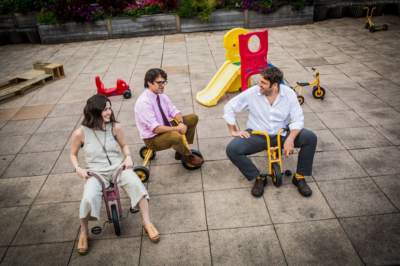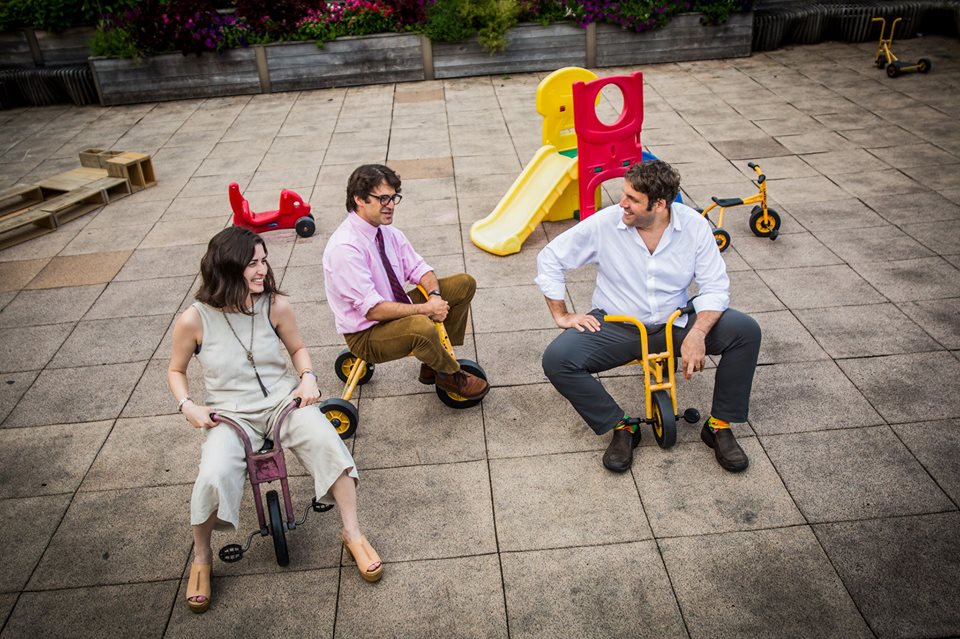
With years of mainstream journalism under his belt, former New York Times columnist Mark Oppenheimer decided to use his voice in a more personal way in 2016. He collaborated with Tablet Magazine’s Stephanie Butnick and Liel Leibovitz to create Unorthodox, a weekly podcast that discusses all things Jewish and Jew-ish. The best part – you don’t need to be observant or even Jewish to enjoy it.
As of May, Unorthodox is the #1 Jewish podcast on iTunes, has a wide listenership in 11 countries, and receives over 1,879,000 downloads. The podcast has managed to capture the attention of Jews young and old across the religious and political spectrum.
I sat down with Oppenheimer, now Tablet’s editor at large, to discuss how Unorthodox went from an idea to a success and his candid thoughts on Jewish media and millennials.
This interview has been condensed for clarity.
Erin Ben-Moche: Unorthodox is almost three years old and really covers a wide variety of Jewish news. Was the transition from non-religious reporting to strictly Jewish news difficult?
Mark Oppenheimer: For me, personally, I was really excited after six years of writing a secular take of news for The New York Times to be able to do more specifically Jewish work. It’s a different experience when you’re writing for a community of people who are deeply involved in a particular religion, and the feedback is just extraordinary. When you’re writing about or talking about Judaism or Jewishly curious people, your writing has a much bigger impact. I get more mail from the thousands of listeners of Unorthodox than I ever did from the millions of readers from The New York Times.
EB: How do you decide what to talk about each week?
MO: I think it’s evolved. At the beginning, if you go back to listen to the very first episodes, we felt more of an obligation to get five or ten of the greatest headlines in the Jewish world, and now we just follow our own idiosyncratic interests. We focus on things where we can give an unorthodox perspective.
EB: Where did the idea for the segment “Jew and Gentile of the Week” come from?
MO: That was all me. I definitely wanted to do interviews and so it made sense to interview Jewish guests. But then I also thought the show would feel a little claustrophobic if we only had Jewish guests, so I thought it was important to have non-Jews help us keep our listeners engaged. It would be stupid to have a show where we could get the chance to interview Barack Obama or with Donald Trump and say “no” because they’re not Jewish. We need thematically really interesting interviews, and we know that a lot of gentiles have interest in Judaism so it gives them an opportunity to ask questions in a safe space.
EB: Speaking of President Trump, the podcast started around the 2016 presidential election coverage, and it’s been interesting to listen from the very beginning. How do you express your views and be as you say, unedited, without damaging your credibility?
MO: The credibility we have with our listeners is that we are very, very honest. We don’t pretend to be striving for any objectivity – in fact it’s quite the opposite. On this show we are striving for radical subjectivity. We are striving to be the most authentic version of ourselves.
EB: Who was your demographic when the podcast was born and how has it changed if it’s changed at all?
MO: We never set out to aim for a particular demographic and we never changed our content because of who we think our listeners are. I would say some of the audience who we speak to a lot is gentiles. I don’t think we had any reason to suspect, and we had thousands, they would tune into the show. Some have obvious reasons – they are intermarried or have Jewish members of the family or are interested in conversion, but a lot of them are just really curious listeners. We get mail all the time from Catholic priests, protestant clergy, Mormons, evangelical Christians, left Catholics, Muslims, you name it. I think in an unconscious way, we look at the audience as a humanity instead of a predominantly Jewish audience.
EB: Being Jewish doesn’t have one specific meaning, and young American Jews are connected with Jewish politics, culture, and religion but not always all three. How does Unorthodox reach the younger Jews each week?
MO: First of all, it’s not just young Jews who don’t want to attend synagogue. Old Jews don’t want to go either. I don’t necessarily think there’s a uniqueness between old and young except that the younger Jews haven’t lived as long. I think that it helps us reach unaffiliated Jews that we ourselves aren’t represented in a particular affiliation. We aren’t doing a show for Conservative Jews or Zionists or a show for social-justice-oriented Jews or a show for observant Jews. We are doing a show created by three Jews who want to talk about Judaism on all spectrums and love. So, our appeal comes from being ourselves and it doesn’t come from a specific target goal.
EB: And the rest follows?
MO: Yeah, you have to follow it organically. Podcasts are a very unusual medium. They are very, very personal, right? When you read a print article, you can’t necessarily see where the writer stands. But when you receive a podcast, you are given the personality to spend time with. Audiences hear our voices and our laugh, and we share insecurities. We are being ourselves and there isn’t really any other way to do it.
EB: Do you see other Jewish organizations trying to do just that? Is it successful?
Absolutely, there are millions of dollars wasted on intentional, earnest appeals to young people, to millennials, to non-affiliated Jews, and to cool Jews. They are insulting and misguided and they pretty much always fail. We all know about very expensive philanthropic efforts to create programming for every category under the sun and those efforts don’t reach people at all and they don’t make a difference. We bypass all of that by being authentic and by taking our religion seriously. We don’t dumb anything down. We will talk about Jewish holidays and the Hebrew language and Yiddish. We’re an in-your-face, dirty bunch, and at the same time, we’ll be candid about the stuff we’re ignorant about. I think rather than trying to reach specific areas, we just are humans who want to make sense of what it means to be Jewish. I think that’s more effective than throwing cool parties and hoping Judaism kicks into it.
EB: What do you think are issues within the Jewish community that could drive away younger generations of Jews if they aren’t addressed?
MO: Well, I think the Jewish community has to get past its obsession with dividing people. It’s true in regard to observance. It’s true with intermarriage and Israel and Zionism. At the end of the day, we should want more people to think of themselves as Jewish. We have to share our love for the people and for Israel instead of holding on to an ideology. It’s easy to deal with these questions by never letting go of the fact that these are family disputes and family should never trail away from each other. I want people to believe that.
Erin Ben-Moche is a New Voices reporting fellow. She recently graduated with a degree in journalism from Oakland University.

